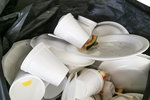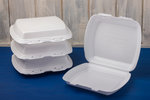 Riviera Beach
Riviera BeachFair, 67°
Wind: 9.2 mph, S
 Riviera Beach
Riviera Beach



By Zach Sparks
When the Anne Arundel County Council waded into a debate about polystyrene in February, the conversation was about more than plastic used for food packaging. The testimony centered on the environment, on regulatory burdens and on ways for Anne Arundel County Public Schools to fund an alternative material for its food trays.
The council’s Democratic majority introduced the bill, which prohibits the use and sale of polystyrene products at food service facilities located in Anne Arundel County. It passed by a 4-3 vote.
A similar bill was passed by the previous county council in June 2018 but was vetoed by then-County Executive Steve Schuh.
Councilwoman Lisa Rodvien, a Democrat from District 6, offered opening remarks during the February meeting.
“I’m just really thrilled to be introducing this bill that will reduce the litter, reduce the pollution in the Chesapeake Bay and take out of our landfills a material that really has no biodegradable traits,” Rodvien said.
Chris Trumbauer, senior adviser for policy and communications for County Executive Steuart Pittman’s office, said the administration is considering an alternative material that would cost AACPS 8 cents per tray. The polystyrene costs 3 cents per tray.
Costs might be lower if Anne Arundel is able to join on a contract used by Montgomery County, Trumbauer said.
District 3 Councilman Nathan Volke of Pasadena said with the county using between 9.6 million and 9.7 million trays a year, the cost difference will be $480,000 or more.
Volke questioned whether that money would be better spent on hiring more teachers. Trumbauer said the county is not offering AACPS $480,000 but that it would help soften the cost during the first year of transition.
“If the cost to provide lunches goes up, our position as an administration is, essentially, we think the lunch fee should go up commensurably,” Trumbauer said. “Whether that’s 3 cents or 5 cents, the math will work itself out.”
Jennifer Aiken spoke as a parent at Bodkin Elementary and co-chair of the school’s environmental fair.
“Students are taught to be good stewards of the bay, to learn about the hazards of these single-use plastics such as polystyrene, they’re encouraged to make green choices, yet they walk into the cafeteria and they don’t have an environmentally friendly option,” Aiken said. “So we’re all aware that it’s cheap and convenient, as discussed, and that is the message that Anne Arundel County is sending our children and families about its concern for environment and public health.”
Her son Barrett, a second-grader at Bodkin, also spoke. “I want polystyrene banned because when it gets in the bay or the ocean, sometimes animals eat it,” he said. “Also, I like to buy lunch but I don’t want to because I know how bad it is for the environment.”
Broadneck High School senior Brynn Bogarde explained her role as president of her school’s Eco Action Team. Along with other volunteers, she has participated in cleanup projects around Broadneck High School and Sandy Point State Park in Annapolis.
“One of the biggest things that we find in all these cleanups is this foam,” she said of polystyrene. “It’s kind of frustrating to us because we’re a green school and we have all these classes — environmental science, biology, all this — and they teach us that the foam is so bad and that plastic is so bad, and then we go to lunch and we have to use these trays every single day, and we have no other choice; we have to use them.”
Opposition came from members of the restaurant and retail industries. Speaking on behalf of the Restaurant Association of Maryland, Melvin Thompson called polystyrene an effective way of maintaining food quality and temperature.
“We believe that such a ban for our industry would significantly increase the cost of disposables without any measurable environmental benefit,” said Thompson, who estimated the costs to be double or triple the materials currently used. “The average restaurant averages only about a 4 percent profit margin and so that means that for every $1,000 in higher costs, it requires at least $25,000 in increased sales just to break even, and that’s very difficult for businesses like ours.”
Volke noted that local grocery stores will be put at a competitive disadvantage if they are subject to a ban while out-of-county retailers are not. While voting, Volke explained his position that the change should be an option, not a mandate.
“This is not going to solve the problem of litter,” Volke said. “This [new material] is still going to wind up in the waste stream. It’s still going to wind up in the landfill. And frankly, it’s going to be more expensive to dispose of than the polystyrene alternative.”
Bill 5-19 takes effect in April 2019 but food service facilities will have until February 2020 to comply with the ban. The Maryland Senate passed a bill that would ban polystyrene foam and cups starting in 2020 and a similar measure has been introduced in the House of Delegates.
READ MORE:
Bodkin Students Celebrate Successful Testimony
Children Get An Intro To Activism As Part Of Campaign Against Single-Use Plastic
Comments
No comments on this item Please log in to comment by clicking here